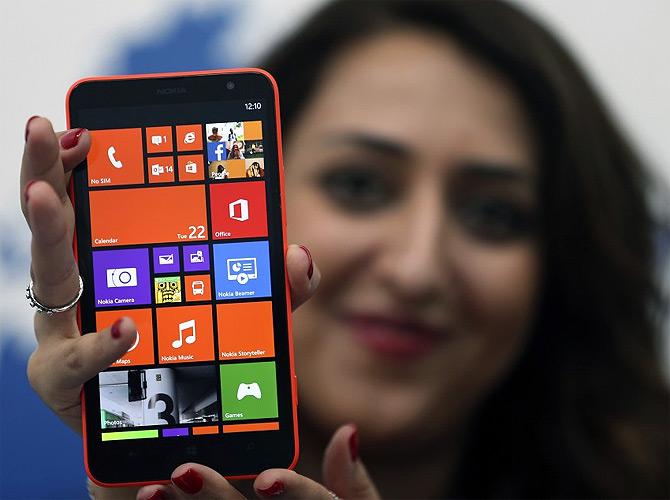Photographs: Reuters Andy Mukherjee
Making sure multinationals pay more taxes to their host countries is a sore point, even in rich nations. India's bossy approach, though, could backfire, says Andy Mukherjee.
Microsoft is lucky to dodge Nokia's tax bill in India. On Dec. 12, the Delhi High Court allowed the Finnish group to transfer its Chennai factory to the U.S. software giant as part of its planned $7.4 billion sale of its mobile handset business.
While the overall deal wasn't in doubt, Microsoft avoids Nokia's hard-to-assess tax liability. If only Vodafone had been so fortunate.
Indian authorities had seized Nokia's local assets after slapping it with a $340 million demand for unpaid taxes dating back to 2007. If the company loses the legal battle, the exchequer's final claim could be as much as ten times that amount, the tax office's lawyer has told Reuters.
...
Microsoft lucky to avoid Nokia's India tax bill
Image: Microsoft CEO Steve Ballmer (L) and Nokia CEO Stephen Elop (R) introduce new Nokia phones with Microsoft's Windows 8 operating system at an event in New York.Photographs: Brendan McDermid/Reuters
That may be bluster, but Microsoft didn't want to find out. The dispute has been out in the open since March, giving lawyers for the Seattle company plenty of time to ensure that any liability stays with Nokia.
The Vodafone debacle explains why. Six years after the British mobile operator acquired its Indian business, it's still fighting a $2 billion claim for tax the authorities say it should have withheld from the price paid to Hutchison Whampoa.
When India's highest court threw out the government's claim, New Delhi changed the tax law with retrospective effect, spooking investors.
...
Microsoft lucky to avoid Nokia's India tax bill
Photographs: Courtesy, Nokia
The tax regime in India has become very wobbly. Nokia says it's been wrongly accused of evading taxes on payments made to its parent for supply of operating software. But the company is not alone.
An Indian court recently told Verizon's unit in Singapore that the fees it receives from corporate clients in India for providing them with dedicated Internet access is taxable as a royalty - and hence subject to the same 10 percent withholding tax that Nokia is being asked to pony up.
...
Microsoft lucky to avoid Nokia's India tax bill
Photographs: Courtesy, Nokia
Making sure multinationals pay more taxes to their host countries is a sore point, even in rich nations.
India's bossy approach, though, could backfire.
Too many countries are desperate for investment dollars. If New Delhi gets too heavy, the net effect will only be to increase India's dependence on Microsoft founder Bill Gates' charity.
...
Microsoft lucky to avoid Nokia's India tax bill
Photographs: Courtesy, Nokia
Story so far
- The Delhi High Court on Dec. 12 cleared the way for Nokia's India unit to sell its handset factory in Chennai to Microsoft.
- In a Sept. 26 interim order, the court had barred Nokia India from transferring ownership of its assets, which have been seized by the Indian income tax authority. The authority is asking Nokia India to settle unpaid withholding taxes on what it claims were royalty payments to its parent in Finland.
- The court asked the Finnish company to deposit Rs 22.5 billion ($367 million) in an escrow account, while the tax demand case will continue separately.
- Nokia had been trying to end the dispute ahead of the sale of its mobile phone business to Microsoft in a 5.4 billion euro ($7.4 billion) deal.
- Including the tax bill for the years that have not been assessed by the Indian authorities, the total liability could rise to roughly 75 billion rupees, Reuters reported on Dec. 11, citing the tax department's lawyer. If Nokia loses the legal battle, it may have to pay as much as 210 billion rupees ($3.44 billion), including penalties and interest, the lawyer said.
- In a statement issued before the court's final order, Nokia said it "has not received any official information on the potential tax claims, and thus far has only seen wildly varying claims from anonymous officials via the media. We do not see any merit in any of the claims."







article